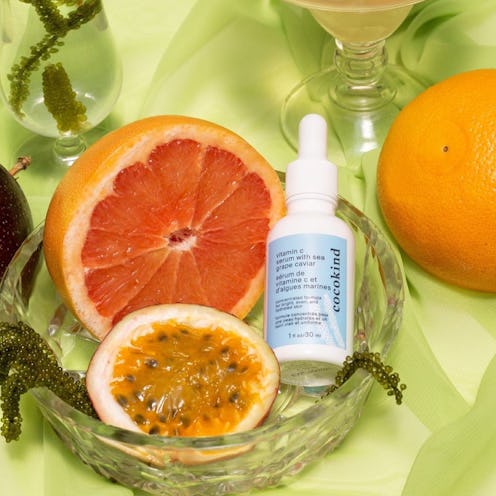(Beauty)
Why Brands Are "Cold-Pressing" Their Skincare Products Now

As natural skincare slowly and strategically takes over the world — it’s predicted that plant-based beauty will be worth $48 billion by 2025, according to Bloomberg — beauty enthusiasts are tasked with learning a whole new language. You're probably already well-acquainted with clean, organic, and non-toxic (none of which have official definitions, by the way). But have you heard of cold-pressed skincare products yet?
While labels like “organic” and “biodynamic” refer to how ingredients are grown and harvested, “cold-pressed” refers to how said ingredients are processed. Typically, there are two main ways to extract oil from raw nuts and seeds: via heat processing, or through the use of chemical solvents. Both methods actually “reduce the quality of the oil by decreasing the active components,” Moe Kittaneh, the CEO of Herbal Dynamics Beauty, explains in an email to TZR — the “active components” being the vitamins, antioxidants, and fatty acids natural oils are known for.
Think of it in terms of cooking: Even if you start out with a super-healthy veggie, the nutritional value of that veggie is considerably lessened once it’s slathered in butter and thrown in the deep fryer (I’m looking at you, buffalo cauliflower bites). In the case of face oils, chemical solvents are the metaphorical butter and heat processing is the deep fryer. The finished product is still delightful, just not as nutritious. Enter: Cold-pressing.
“When oils are cold-pressed, they are extracted from their source using mechanical methods rather than heat or solvents,” Kittaneh says. “An expeller compresses the ingredient until its oil is released and then filtered. Because the ingredient undergoes very little processing, its nutrients are better retained" — which explains the cold-pressed juice craze. The effect hasn’t been extensively studied, but research does suggest that cold-pressed oils have the upper hand on their heat- or chemically-processed counterparts, in more ways than one.
For starters, one study showed increased “antioxidant capacity” in cold-pressed oil — and more antioxidants (like vitamins A, C, and E) equals more protection and prevention for your skin. It also noted a spike in tocopherol, a natural preservative; while another research paper found cold-pressed oils to be “higher in oleic acid, indicating better oxidative stability.” Both mean that cold-pressed oils have a naturally longer shelf life, and can often forgo fillers and synthetic preservatives. All in all, cold-pressing delivers a pure, potent, highly effective product… so why aren’t all oils cold-pressed, again?
“Heating and solvent methods produce a larger amount of oil,” Kittaneh explains. Basically, these techniques require less effort, less money, and less material while producing more oil — a nutritionally sub-par oil, sure, but most manufacturers are more than OK with that trade-off (because, profits).
Luckily, more beauty brands are beginning to invest in cold-pressing — so your complexion can reap the rewards. Ahead, 10 cold-pressed face oils to add to your growing natural skincare collection.